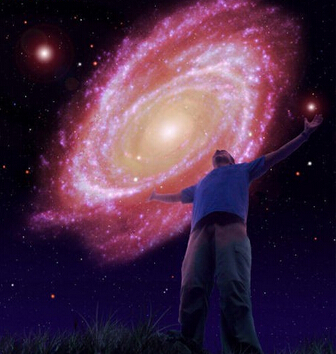
A new US TV show has *captivated people’s attention all over the world, giving rise to numerous newspaper commentaries, interviews and discussions on prime time news broadcasts. No, we are not talking about the hit fantasy series Game of Thrones, but rather, a science documentary series titled Cosmos: A Spacetime Odyssey.
The 13-part show kicked off in March and will come to its journey’s end in June. It has made TV history. According to National Geographic, it is the largest global *rollout of a TV series ever, appearing on 220 channels in 181 countries and 45 languages.
The popularity of the show is partly due to its charismatic host, Neil deGrasse Tyson. Tyson, according to some US media outlets, is the most beloved *astrophysicist in the country. He has a *knack for making complex scientific facts interesting and accessible to common people. He is a popular science writer, appears in numerous science programs on TV, and hosts the weekly radio show and podcast Star Talk. Cosmos, in turn, has made Tyson the single most visible public face of science in the US today.
Tense topics
But not everyone is happy about the show and to see Tyson become so popular. In the US, because of religious right groups and *conservatism, scientific topics like evolution and climate change have become politically controversial. Religious right groups, according to a Salon article, are “freaking out” about the show. They believe God created the universe and all living things in it.
As for climate change, recent polls show there are still many people in the US who don’t think global warming is happening, a New York Times article reported.
But Cosmos doesn’t shy away from these topics. The first few episodes of the show saw Tyson explain the Big Bang Theory and human evolution. And just before US President Barack Obama unveiled on June 2 regulations to cut carbon pollution from power plants by 30 percent from 2005 levels by 2030, Tyson *confronted climate deniers in that week’s episode. He said that global warming is not caused by “those damn *volcanoes”, but rather, we humans are the problem.
Even if you are not interested in science, you should watch the show, simply because you are a member of this universe.
Tyson said at the show’s premiere: “The goal [of the show] is to convey why science matters to the person, to our society, to us as *shepherds of this planet. It involves presenting science in ways that connect to you, so Cosmos can influence you not only intellectually but emotionally, with a celebration of wonder and *awe.
“Science should be part of everybody’s life. The *prerequisite is not that you become a scientist. It’s that at the end of the series, you will *embrace science and recognize its role in who and what you are,” said Tyson.












